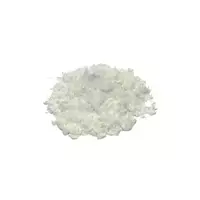Cornstarch

Corn starch is a white, not particularly clear clayster having a low degree of viscosity. The smell and taste of starch are characteristic of corn grains. As a result of drying, it becomes a loose substance, a white powder with a barely detectable yellow tint. As for its chemical composition, corn starch is characterized by an excessively low content of substances such as protein and ash. The main properties of corn starch can be called increased swelling ability even in cold water. It is quite interesting that compared to the starting product, the swollen starch does not change at the chemical level.
Many are interested in the question of how corn starch is mined. The essence of the process is as follows: in corn grains, starch is interconnected using proteins, to dissolve which corn is soaked in a solution of sulfurous acid. After that, the grain is crushed, and the embryo is released. Then the cereal is additionally ground, during which starch milk is released. Interestingly, the starch is separated from the insoluble protein in huge centrifuges and then thoroughly washed and dried to produce a dry food product. The calorie content of corn starch is slightly higher than potato starch and is 343 kcal per 100 grams.
In the food industry, corn starch is used in the meat and dairy and bakery industries, in the production of ketchup and mayonnaise. Hostesses add this product when making various sauces and puddings, as well as pie fillers. In cases where the action of gluten needs to be weakened, giving a special tenderness and greater softness to the finished product, this powder is just by the way. In the confectionery industry, over-dried starch is indispensable in the manufacture of soft sweets, since it has low humidity.
Benefits of corn starch
The benefits of corn starch can be traced not only in cooking, but also in the field of medicine. It is an important ingredient in the manufacture of powders, ointments, mixtours, cosmetic powders, various pastes and agents used to treat skin diseases.
In addition, eating foods with a small content of this bulk substance can have a positive effect on human health. The benefits of corn starch are due to the ability to activate the formation of muscle mass and nourish nerve cells.
Corn starch harms
The harm of corn starch can be traced in the presence of individual intolerance to the starting product, that is, corn, but this is extremely rare. It manifests itself in the form of allergic reactions, asthma and skin rash.
corn starch 343 kCal
Energy value of corn starch (Ratio of proteins, fats, carbohydrates - ju):
Proteins: 1 g (~ 4 kCal)
Fats: 0.6 g (~ 5 kCal)
Carbohydrates: 83.5 g (~ 334 kCal)
Energy ratio (bj | y): 1% | 2% | 97%
 Español
Español Français
Français Português
Português Русский
Русский 简体中文
简体中文 繁體中文
繁體中文 日本語
日本語 한국어
한국어 العربية
العربية Türkçe
Türkçe Қазақ
Қазақ Deutsch
Deutsch Italiano
Italiano Українська
Українська
